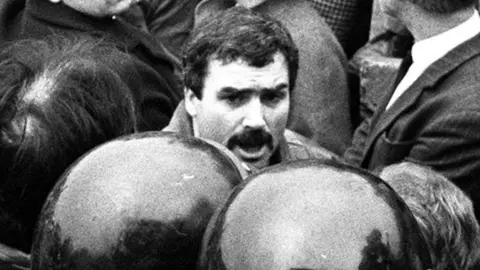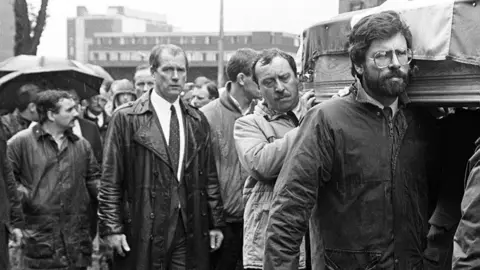Who was Army's IRA spy Freddie Scappaticci?
 Pacemaker
PacemakerFreddie Scappaticci once told one of his captives that if he had his way he would be hung upside down in a cowshed and no-one would hear him squeal as he was skinned alive.
The would-be victim Sandy Lynch was rescued from IRA execution by the security forces.
The year was 1990 and Mr Scappaticci's double life as an agent within the IRA was approaching an end.
But it would be a further 13 years before he was unmasked as Stakeknife.
Mr Scappaticci, who died in 2023, was for a long period the British Army's "golden egg" within the IRA.
 Pacemaker
Pacemaker"Scap", as he was known, was born to an Italian family which came to Belfast in the 1940s.
A bricklayer by trade, he was interned without trial between 1971 and 1974.
A few years later he became a paid spy for the Army, reportedly crossing over after being beaten up by the IRA following a row with a senior member.
By the 1980s he was operating at the heart of the IRA, within its internal security unit.
It was known as the "nutting squad" because the informers it uncovered were shot in the head - the nut - and their bodies dumped after interrogations involving torture.
Access to IRA secrets
He has been linked to at least 18 murders, all while he was on the state payroll, and some of the victims were fellow agents.
His position gave him access to IRA secrets - his unit was known as the Clapham Junction of the organisation, according to one former IRA member, because everything went through it.
His life as an agent - and involvement with the IRA - ended when its suspicions grew after the incident involving Sandy Lynch.
But it was not until 2003 that Mr Scappaticci was outed by the media as the agent codenamed Stakeknife.
He denied it and left Northern Ireland a year later when a recording surfaced of him talking to journalists about senior republicans, including Martin McGuinness.
His death almost two decades later has robbed victims' families of the prospect "of some semblance of justice", according to Kevin Winters, the solicitor representing many of them.
All eyes are now focused on the publication of a report into Stakeknife's activities.
 Pacemaker
PacemakerIt is in the process of being compiled by Jon Boutcher, the former chief constable of Bedfordshire Police, whose Operation Kenova investigation has cost £37m.
Operation Kenova has investigated historical crimes in Northern Ireland, covering murder and torture, and the role of the state, including MI5.
Mr Boutcher has said the report into Stakeknife's activities will be released sometime this year - and not before the Cabinet Office checks whether its contents will be "contrary to the public interest or prejudicial to national security".
Will it spill any secrets which went to the grave with Mr Scappaticci?
